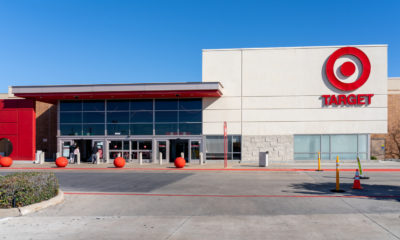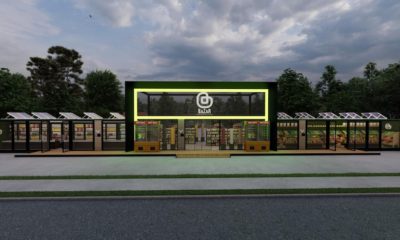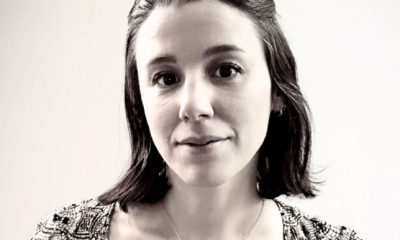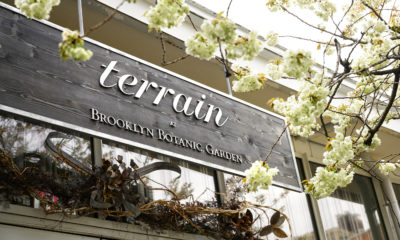NXTLVL Experience Design
Episode 66: Maya Colombani
“Responsibly Sustainable: The Only Way of Doing Business,” with Maya Colombani, Chief Sustainability and Human Rights Officer, L’Oréal Canada
Published
1 month agoon
By
David KepronEPISODE SUMMARY
Maya Colombani is a passionate advocate for sustainability practices and corporate responsibility for social transformation. She has profoundly transformed the L’Oréal approach to sustainable development and human rights fueling new reflections both on environmental issues as well relations with the indigenous people. Maya’s voice for change earned her the prestigious “Canada’s Clean 50” award that “recognized the most impactful 50 individual leaders that have demonstrated measurable leadership in fighting climate change and helping Canada transition to a low-carbon economy.” In Ep. 65 “Responsibly Sustainable: The Only Way To Do Business” of the NXTLVL Experience Design podcast, Colombani and host David Kepron deep dive into sustainability and human rights-focused business practices that will shift more than the beauty business paradigm.
EPISODE NOTES
About Maya Colombani:
Maya’s Profile
linkedin.com/in/maya-colombani-0a118369
Websites:
- https://www.loreal.com/en/nordics/pages/commitments/l-oreal-for-the-future/
Email:
info@laurainserra.comLaura Inserra
MAYA’S BIO:
Maya Colombani – L’Oréal Canada – Chief Sustainability & Human Rights Officer
Maya Colombani has been appointed Chief Sustainability and Human Rights Officer of L’Oréal Canada in April 2022. With an international career of over 20 years at L’Oréal, Maya is distinguished by a rich and comprehensive professional background. She began her career in France, working for leading design and advertising agencies such as Dragon Rouge, Publicis, and Euro RSCG. She then joined L’Oréal’s Professional Products division in 2001. There, she held positions in operational marketing and DMI (Direction Marketing International), for Kérastase and L’Oréal Professionnel. She carried out assignments in India and in the Western Europe zone, before moving to Brazil in June 2010 where she worked in marketing functions. Since the end of 2016, she has been Director of Sustainable Development for Brazil.
In this role, she profoundly transformed L’Oréal Brazil’s approach to sustainable development and human rights. She has implemented actions that inspired the L’Oréal Group and positioned L’Oréal Brazil as a national benchmark. L’Oréal Brazil is indeed regularly cited as an example and is used to fuel new reflections, both on environmental issues and on human rights issues, as well as with respect to the relations with the indigenous people of Brazil.
Her projects have been rewarded by the best rankings such as Guia Exame 2017/2018/2019; recognized as the best company in climate change as well as biodiversity management; and has received the WEP gold award 2021 on women empowerment supported by ONU Women and Compact Global.
In 2022, thanks to her strong inclusive social programs for indigenous and communities, the GLOBO recognized L’Oréal Brazil as “The company that makes the difference in term of inclusion and diversity.”
In Canada, Maya’s mission is to increase the positive footprint internally and externally in terms of sustainable development and human rights, and to accelerate the actions carried out within the framework of “L’Oréal For the Future.” Among her first projects, she has already focused, with the Canadian teams, on achieving the company’s full carbon neutrality on all its sites, as well as accelerating ambitious targets on water management and implementing cleantech partnership and eco-design business with committed brands.
Thanks to impactful projects in Canada, earned her the prestigious “Canada’s Clean 50” award that “recognized the most impactful 50 individual LEADERs that have demonstrated measurable leadership in fighting climate change and helping Canada transition to a low-carbon economy.” Another important achievement for Maya is being named President of the “Positive Impact Club” of the French CCI in Canada, to have a positive impact on our society and reinforce the bond between France and Canada.
Maya graduated from Reims Business School and completed an MBA semester of International Business Strategy in Victoria University, Australia. She now lives in Montreal, Québec, Canada with her family.
Advertisement
SHOW INTRO:
Welcome to the NXTLVL Experience Design podcast.
These dynamic dialogues based on our acronym DATA – design, architecture, technology, and the arts crosses over disciplines but maintains a common thread of people who are passionate about the world we live in and human’s influence on it, the ways we craft the built environment to maximize human experience, increasing our understanding of human behavior and searching for the New Possible.
The NXTLVL Experience Design podcast is presented by VMSD Magazine part of the Smartwork Media family of brands.
VMSD brings us, in the brand experience world, the International Retail Design Conference. The IRDC is one of the best retail design conferences that there is bringing together the world of retailers, brands and experience place makers every year for two days of engaging conversations and pushing the discourse forward on what makes retailing relevant. You will find the archive of the NXTLVL Experience Design podcast on VMSD.com.
Thanks also goes to Shop Association the only global retail trade association dedicated to elevating the in-store experience.
AdvertisementSHOP Association represents companies and affiliates from 25 countries and brings value to their members through research, networking, education, events and awards. Check then out on SHOPAssociation.org
In this episode I talk with Maya Colombani Chief Sustainability and Human Rights Officer of L’Oréal Canada. Maya is one of the most passionate proponents of rethinking sustainable business practices and supporting human rights that I have ever met. Her energy is infectious and her passion is a positive push to do more in support of people and the planet.
First though, a few thoughts…
* * *
Certain themes keep on emerging in my discussions with my guests. Health, wellness, and sustainability frequently come into the conversation regardless of whether or not I’m speaking to a designer, a neuroscientist, an artist or obviously someone who’s work life is focused on sustainable design Practice within their business.
We are more aware today of the influence of the built environment on our mind body state, our very psychology and neurophysiological makeup. I have often referred to this as ontological design – The fact that the things we design and bring into the world design us back.
The field of neuroaesthetics that have come up in previous conversations with Susan Magsamen and Ivy Ross in the ir book Your Brain on Art or with Tasha Golden in my discussion with her and the work she does at the Arts and Mind Lab at Johns Hopkins have pointed out that the psychological effects of bad or simply banal buildings is part of our potential mental health crisis.
Advances in neuroscience driven by technologies is allowing us to see into the human brain and understand the interrelationships between its functional areas and it’s and our connection to the environment in a way that we have not been able to do so before. And because of this new ability we are more able to determine, with a very high degree of confidence, what goes on in our inner world when we are immersed in our outer world.
We’ve talked about color and its influence on our mind body state with Valerie Corcias and we’ve talked about music and how the arts having a deeply resonant place in our collective experience of our social groups and culture.
Sustainability keeps on emerging as an obvious focus in the guests that I speak to whether it was with Bruce Mau and talking about his book MC24 or Martin Kingdon and his relationship to the store fixture manufacturing world in Europe and then there was Denise Naguib, of VP of Sustanability and Vendor Diversity at Marriott International, who I won’t soon forget reminded me that the planet will be just fine without us and that we just have to decide whether or not we want to live here.
When I go to conferences and I listen to the subjects that are often talked about by keynote presenters, panelists and just the everyday conversations that happen outside of the lecture room, sustainable design practice quickly surfaces and becomes a focal point.
I think to most of us now, we are aware that we are facing an existential crisis that will shape the course of humanity in the near future. There are some that say we are already too late that reversing the effects of climate change maybe a losing battle.
There are others that soldier on believing that it is the responsible thing for us to do and that changing our approach to living, manufacturing, building and other human endeavours needs to be reconsidered so that we change to protecting the planet from ourselves, not so much for the planet itself but for the fact that if we want to live here we need to be able to preserve Mother Nature and be good stewards of the gift that we have been given.
When you consider the length of time that this little blue dot has been spinning around our sun, somewhere in the neighborhood of 4.5 billion years, and you consider the amount of time that humans have been occupying the earth, it should be setting off alarm bells that in just a couple of centuries we’ve begun to destroy the ecosystem that was here long before we arrived.
And that frankly will be here a long time after we are gone.
The challenge is that I don’t think we’re going to be able to get off this planet and get on an interplanetary transport to Mars and build colonies there before this earth go through some significant changes that will affect all of humankind.
Is it too late?
It may be but one thing is for sure, if we don’t change our practices and think about regenerating nature along with driving capitalism forward we will most definitely end up in a climate disaster. And so, this is why it is so important that the practices and policies that are being pushed forward by people like my guest on this episode, Maya Colombani, are so critical to the course of humanity.
One of the obvious things is that sustainable design practices are not just about saving the planet and providing a viable environment for humans but they also happen to be good for business. One of the opportunities here is to change our thinking about how we see innovation in the sustainable design space and make sure that we consider that it is something that brings value for business and societies.
Retailers and manufacturers have a responsibility with the power they wield to address innovating our way into a sustainable future that addresses directly the effects of climate change.
Part of this of course is going back to our roots – meaning engaging indigenous communities in understanding how to treat the planet better. A westernized mentality towards dominating the planet and its people have put us on a collision course with a disastrous future. If we could fully realized that indigenous communities can teach western societies a great deal about how to manage our resources we would ultimately be much better off.
One school of thought is that we have created this problem and we can therefore therefore fix it, but my hunch is that we are not going to be able to continue to be so arrogant as to believe that we can do it on our own.
Large corporations need to turn to the ancient wisdom of indigenous peoples and engage them in a collaborative process of sustainable and social responsibility which should be, in the end, at the center of all of the decisions that we make.
L’Oreal Canada along with Maya Colombani wants to be a laboratory for good and they want to reinvent retail and corporate manufacturing policies that are good for society with the added benefit of it being also good for their business. That involves engaging the corporate structure including suppliers in the process of rethinking how they bring goods to market.
Maya Colombani will say that it’s not good enough just to fight climate change… what we have to do is regenerate nature and part of that is that sustainability is not about having good intentions it’s about action and measurable outcomes.
This of course requires a significant shift in mindsets which is very difficult, kind of like changing the direction of the aircraft carrier in the middle of the ocean because in the end the future belongs not in the hands of major companies but in those of the citizens of the world who have, through their buying power, the ability to vote for companies who are doing the right thing and to do so with their wallets.
Maya Colombani would say that in sustainable development there is never an individual victory but only great collective victories that push us to grow further every day. Having won a number of awards for her efforts she sees these recognitions as an invitation to work even harder and faster to face the unprecedented global humanitarian and climate crisis that we are currently embroiled in.
Maya Colombani was appointed Chief Sustainability and Human Rights Officer of L’Oreal Canada in April 2022.
In her more than 20 years with the company prior to her current role, she had carried out assignments in India and Western Europe and then moved to Brazil in 2010 where she worked in marketing functions.
In 2006 she was the director of sustainable development for Brazil. While in this role of she transformed L’Oreal Brazil into a national benchmark for how to rethink both environmental and human rights issue as well as our respect for relations with indigenous peoples.
She has received many distinguished awards being recognized for her passionate approach to people and the planet. In Canada, Maya’s mission is to increase the positive footprint internally and externally in terms of sustainable development and human rights and to accelerate the actions carried out within the framework of “L’Oreal For The Future.”
She has been focused on achieving the company’s full carbon neutrality on all of its sites as well as accelerating ambition targets on water management and implementing clean tech partnerships and eco design businesses with committed brands.
Thanks to the impactful projects in Canada she earned the prestigious Canada’s “Clean 50” award that recognized the 50 most impactful individual leaders that have demonstrated measurable leadership in fighting climate change and helping Canada transition to a low carbon economy.
When I met Maya Colombani at the Bensadoun School of Retail Management Retail Summit in the fall of 2023, I was immediately struck by her energy and passion for this subject.
I think you’ll discover in this episode that to say that Maya is passionate about people on the planet might be an understatement.
ABOUT DAVID KEPRON:
LinkedIn Profile: linkedin.com/in/david-kepron-9a1582b
Websites: https://www.davidkepron.com (personal website)
vmsd.com/taxonomy/term/8645 (Blog)
Email: david.kepron@NXTLVLexperiencedesign.com
Twitter: DavidKepron
Personal Instagram: https://www.instagram.com/davidkepron/
NXTLVL Instagram: https://www.instagram.com/nxtlvl_experience_design/
Bio:
David Kepron is a multifaceted creative professional with a deep curiosity to understand ‘why’, ‘what’s now’ and ‘what’s next’. He brings together his background as an architect, artist, educator, author, podcast host and builder to the making of meaningful and empathically-focused, community-centric customer connections at brand experience places around the globe.
David is a former VP – Global Design Strategies at Marriott International. While at Marriott, his focus was on the creation of compelling customer experiences within Marriott’s “Premium Distinctive” segment which included: Westin, Renaissance, Le Meridien, Autograph Collection, Tribute Portfolio, Design Hotels and Gaylord hotels.
In 2020 Kepron founded NXTLVL Experience Design, a strategy and design consultancy, where he combines his multidisciplinary approach to the creation of relevant brand engagements with his passion for social and cultural anthropology, neuroscience and emerging digital technologies.
As a frequently requested international speaker at corporate events and international conferences focusing on CX, digital transformation, retail, hospitality, emerging technology, David shares his expertise on subjects ranging from consumer behaviors and trends, brain science and buying behavior, store design and visual merchandising, hotel design and strategy as well as creativity and innovation. In his talks, David shares visionary ideas on how brand strategy, brain science and emerging technologies are changing guest expectations about relationships they want to have with brands and how companies can remain relevant in a digitally enabled marketplace.
David currently shares his experience and insight on various industry boards including: VMSD magazine’s Editorial Advisory Board, the Interactive Customer Experience Association, Sign Research Foundation’s Program Committee as well as the Center For Retail Transformation at George Mason University.
He has held teaching positions at New York’s Fashion Institute of Technology (F.I.T.), the Department of Architecture & Interior Design of Drexel University in Philadelphia, the Laboratory Institute of Merchandising (L.I.M.) in New York, the International Academy of Merchandising and Design in Montreal and he served as the Director of the Visual Merchandising Department at LaSalle International Fashion School (L.I.F.S.) in Singapore.
In 2014 Kepron published his first book titled: “Retail (r)Evolution: Why Creating Right-Brain Stores Will Shape the Future of Shopping in a Digitally Driven World” and he is currently working on his second book to be published soon. David also writes a popular blog called “Brain Food” which is published monthly on vmsd.com.
The next level experience design podcast is presented by VMSD magazine and Smartwork Media. It is hosted and executive produced by David Kepron. Our original music and audio production by Kano Sound.
The content of this podcast is copyright to David Kepron and NXTLVL Experience Design. Any publication or rebroadcast of the content is prohibited without the expressed written consent of David Kepron and NXTLVL Experience Design.
Make sure to tune in for more NXTLVL “Dialogues on DATA: Design Architecture Technology and the Arts” wherever you find your favorite podcasts and make sure to visit vmsd.com and look for the tab for the NXTLVL Experience Design podcast there too.
David Kepron is formerly the VP - Global Design Strategies – Premium Distinctive Brands at Marriott Intl., responsible for the strategic design direction for Westin, Le Meridien, Renaissance, Autograph Collection, Tribute Portfolio, Design Hotels and Gaylord Hotels. He is also the founder of Retail (r)Evolution, LLC and NXTLVL Experience Design, LLC. In his latest venture, NXTLVL Experience Design, Kepron brings years of retail and hospitality design expertise to the making of meaningful customer connections at brand experience places around the globe. His multidisciplinary approach to design focuses on understanding consumer behavior and the creation of relevant brand engagement moments at the intersection of architecture, sociology, neuroscience and emerging digital technologies. As a frequently requested speaker to retailers, hoteliers and design professionals nationally and internationally, David shares his expertise on subjects ranging from consumer behaviors and trends, brain science and buying behavior, store design and visual merchandising as well as creativity and innovation. @davidkepron; www.retail-r-evolution.com.

FEATURED VIDEO
MasterClass: ‘Re-Sparkling’ Retail: Using Store Design to Build Trust, Faith and Brand Loyalty
HOW CAN WE EMPOWER and inspire senior leaders to see design as an investment for future retail growth? This session, led by retail design expert Ian Johnston from Quinine Design, explores how physical stores remain unmatched in the ability to build trust, faith, and loyalty with your customers, ultimately driving shareholder value.
Presented by:
Ian Johnston
Founder and Creative Director, Quinine Design
Advertisement

Blackstone to Buy Tropical Smoothie Café

More Toys “R” Us Shops Headed to UK

MasterClass: ‘Re-Sparkling’ Retail: Using Store Design to Build Trust, Faith and Brand Loyalty
SUBSCRIBE

Bulletins
Get the most important news and business ideas from VMSD magazine's news bulletins.
Advertisement
Most Popular
-

 Photo Gallery1 week ago
Photo Gallery1 week agoThe 2024 Shop! Design Awards Winners
-

 Headlines4 days ago
Headlines4 days agoTarget Sued for Biometric Surveillance
-

 Headlines1 week ago
Headlines1 week agoALDI Launches Checkout-Free Grocery
-

 Headlines2 weeks ago
Headlines2 weeks agoLong Island Shopping Center Sold for $8M
-

 Headlines1 week ago
Headlines1 week agoMicro Grocery Store Being Built in Tulsa
-

 Designer Dozen1 week ago
Designer Dozen1 week ago2024 Designer Dozen: Lisa Rachielles
-

 Headlines1 week ago
Headlines1 week agoAnthropologie’s Terrain Unit Opens Store at Brooklyn Botanic Garden
-

 Headlines1 week ago
Headlines1 week agoNew Report Reveals How Deeply Retailers Are Affected by Theft














